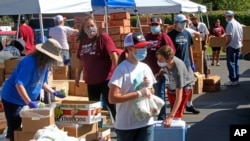The humanitarian aid group CARE says the coronavirus pandemic is likely to aggravate the world’s food insecurity and hunger crisis.
CARE says in a new report the number of people around the globe facing severe food insecurity or a food crisis could nearly double to 270 million by the end of the year.
The number of people in Latin American facing food shortages has tripled, while the number has doubled in West and Central Africa and exploded by as much as 90% in Southern Africa, according to the report.
People in developed countries are facing pandemic-related food insecurity as well. CARE reported that 1 in 4 adults in Britain struggles to gain access to affordable and nutritious food, while at least 6 million Americans have registered for food benefits since the virus began to spread.
The number of COVID-19 deaths in Latin America passed the 250,000 mark on Thursday, according a Reuters count.
The region is experiencing more than 3,000 deaths a day and the number of new cases reported each day is rising in Argentina, Colombia, and Peru.
Brazil still leads Latin America with more than 3.5 million cases and 112,304 deaths, according to the Johns Hopkins University Coronavirus Resource Center. Only the U.S., with almost 5.6 million cases and more than 174,000 deaths, exceeds Brazil’s toll.
The medical aid group Doctors Without Borders (MSF) said Thursday that the Brazilian government is stopping it from finding or preventing cases among the Terena Indigenous people of southern Brazil.
MSF says it is being cut off from seven Terena villages.
The Brazilian government agency that provides the Indigenous population with medical help says it has its own doctors and that the MSF plan was unauthorized.
Brazilian Indigenous rights groups say the government allows Christian missionaries to work in the villages despite the risk of the outsiders bringing in the coronavirus.
MSF said it “has strict infection prevention and control protocols that it has successfully applied during its work to combat COVID-19 worldwide.”
Indigenous protesters Thursday resumed their blockade of a key Brazilian grain highway in the state of Para, stopping trucks carrying corn, according to federal highway police.
The Kayapó tribe says the federal government has failed to protect it from the coronavirus, which has killed four tribal elders.
A senior Mexican official says Mexico will get at least 2,000 test doses of the new coronavirus vaccine developed in Russia, which approved it last week without the advanced trials usually required to prove the effectiveness of a vaccine.
Medical experts around the world have expressed skepticism over the vaccine dubbed “Sputnik V” by its makers in a nod to a Soviet satellite that was part of an effort to develop a manned space program.
Mexico will test it among its population, according to Mexican Foreign Minister Marcelo Ebrard. Russia says it will carry out its tests of the vaccine starting next week and says foreign researchers will help oversee the trials.
U.S. medical experts are warning people against consuming the plant extract oleandrin or the plant itself after reports surfaced that U.S. President Donald Trump wants the Food and Drug Administration to approve it as a COVID treatment.
"This is very worrisome as consumption of either the plant oleander, or its toxic compound oleandrin, can both cause death," Emory University expert on plants and medicine Cassandra Quave told Newsweek magazine.
Trump supporter Mike Lindell, best known as the manufacturer and TV pitchman of pillows, has told CNN that Trump is apparently enthusiastic about the plant.
Oleandrin is one of several toxic compounds from the oleander plant—an evergreen shrub or small tree that is popular with landscapers.





